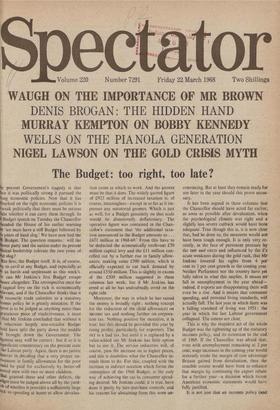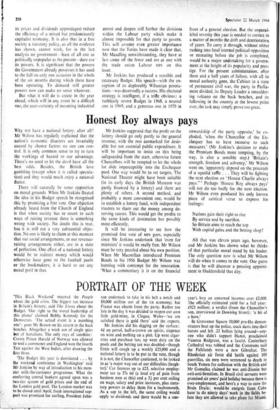Le e present Government's tragedy is that n it was politically
strong it pursued the ng economic policies. Now that it has ktharked on the right economic policies it is weak politically that there must be serious - oubt whether it can carry them through. In i, Budget speech on Tuesday the Chancellor kunded. the House of his earlier warning Istt 'we. must have a stiff Budget followed by ko years of hard slog.' We have now had the 141 Budget. The question remains: will the 'abour party and the nation under its present 5litical: leadership tolerate the two years of ittd slog?
131a first, the Budget itself. It is, of course, 4y to cavil at any Budget, and especially at lit as harsh and unpleasant as this week's. 15r can Mr Jenkins's first Budget escape tsure altogether. The retrospective once for 1 capital levy on the rich is economically ttlevant, and if the Chancellor thinks that it III reconcile trade unionists to a statutory tomes policy he is greatly mistaken. If the )post is to be judged as anything more than gratuitous piece of vindictiveness, it must that Mr Jenkins concluded that without it 4 otherwise largely non-socialist Budget ould have split the party down the middle kl brought down the Government. The dginent may well be correct : but if so it is ignificant commentary on the present state the Labour party. Again, there is no justice iatever in deciding that a very proper im- tiventent in family allowances for the poor NIld be paid for exclusively by better-off 4rr1cd men with two or more children. tion room in which to work. And the answer must be that it does. The widely quoted figure of £923 million of increased taxation is, of course, meaningless—except in so far as it im- presses any untutored gnomes. Which is just as well, for a Budget genuinely on that scale would be disastrously deflationary. The operative figure was contained in the Chan- cellor's statement that 'the additional taxa- tion announced in the Budget amounts to ... £671 million in 1968-69.' From this have to be deducted the economically irrelevant £70 million capital levy and the Ell million can- celled out by a further rise in family allow- ances; making some £590 million, which is officially expected to cut back demand by around £550 million. This is slightly in excess of the £500 million suggested in these columns last week; but if Mr Jenkins has erred at all he has undoubtedly erred on the right side.
Moreover, the way in which he has raised the money is broadly right: nothing (except for the reduction of the child allowance) on income tax and nothing further on corpora- tion tax. Nothing positive for incentive, it is true; but this should be provided this year by rising profits, particularly for exporters. The SET is a bad tax, but until it is replaced by a value-added tax Mr Jenkins has little option but to use it. The service industries will, of course, pass the increase on in higher prices. and this is doubtless what the Chancellor in- tends them to do. For this, coupled with the increase in indirect taxation which forms the centrepiece of the 1968 Budget, is the only way of achieving the cut in consumer spend- ing desired. Mr Jenkins could, it is true, have done it partly by hire-purchase controls, and his reasons for abstaining from this were un- convincing. But at least they remain ready for use later in the year should this prove neces- sary. its prices and dividends appendages) reduce the efficiency of a mixed but predominantly capitalist economy. It is also that in a free society a statutory policy, as all the evidence has shown, cannot work, for in the last analysis no government—least of all one as politically unpopular as the present—dare use its powers. It is significant that the powers the Government already possesses it has used to the full on only one occasion in the whole of the six months during which these have been operating. To demand still greater powers now can make no sense whatever.
But what it will do is create in the year ahead, which will in any event be a difficult one, the near-certainty of mounting industrial unrest and deepen still further the divisions within the Labour party which make it almost impossible for that party to govern. This will assume even greater importance now that the Tories have made it clear that, Mr Maudling notwithstanding, they have at last come off the fence and are at one with the trade union Labour MPS on this issue.
Mr Jenkins has produced a sensible and necessary Budget. His speech—with the ex- ception of its deplorably Wilsonian perora- tions—was deservedly a success. His electoral strategy is intelligent, if a trifle obvious: a ruthlessly severe Budget in 1968, a neutral one in 1969, and a generous one in 1970 in front of a general election. But the unparal- leled severity this year is needed to correct in a matter of months the drift and deterioration of years. To carry it through, without either rushing into fatal internal political opposition or retreating before the job is completed, would be a major undertaking for a govern- ment at the height of its popularity and pres- tige. For the present administration, after three and a half years of failure, with all its moral authority gone, the Cabinet in a state of permanent civil war, the party in Parlia- ment divided, its Deputy Leader a smoulder- ing volcano on the back benches, and its following in the country at the lowest point ever, the task may simply prove too great.







































 Previous page
Previous page